Add this eBook to your basket to receive access to all 54 records. Our indexes include entries for the spelling tilston. In the period you have requested, we have the following 54 records (displaying 21 to 30): These sample scans are from the original record. You will get scans of the full pages or articles where the surname you searched for has been found. Your web browser may prevent the sample windows from opening; in this case please change your browser settings to allow pop-up windows from this site. Adultery Trial Witness Statements (1770)
Richard lord Grosvenor sued Henrietta lady Grosvenor, his wife, for adultery. Detailed statements of evidence were provided by various servants and others attached to the family. Each deposition is prefixed by details of the witness's address, trade, and age. Apart from the main witnesses, many others are mentioned in these depositions.
| Sample scan, click to enlarge
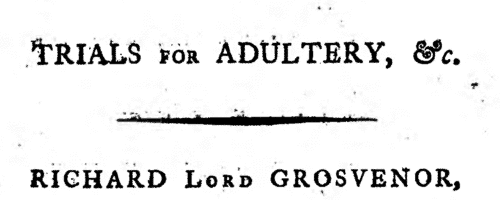
| City of Westminster Voters
(1780)
The poll for the election of two citizens to serve in Parliament for the City and Liberty of Westminster was begun 7 September and ended 23 September 1780, the candidates being the Hon. Charles James Fox (F), Sir George Brydges Rodney, bart. (R), and the Right Hon. Thomas Pelham Clinton the Earl of Lincoln (L). In this poll book the names of all voters are given, by parish and within each parish by street, arranged alphabetically by surname and christian name, with the individual votes cast shown in the right hand columns. Pages 1 to 48 cover the parish of St George, Hanover Square; 49 to 100, St Martin; 101 to 134, St Clement and St Mary le Strand; 135 to 155, St Ann, Soho; 157 to 166, St Paul, Covent Garden; 167 to 170, St Martin le Grand; 171 to 224, St James; 225 to 274, St Margaret and St John. | Sample scan, click to enlarge
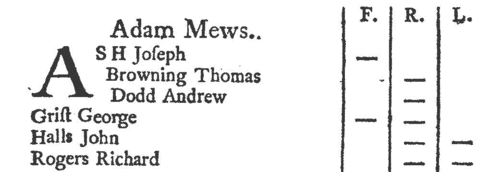
|  Apprentices and clerks
(1790) Apprentices and clerks
(1790)
Apprenticeship indentures and clerks' articles were subject to a 6d or 12d per pound stamp duty: the registers of the payments usually give the master's trade, address, and occupation, and the apprentice's name, as well as details of the date and length of the apprenticeship. 2 January to 31 December 1790. IR 1/34 | Sample scan, click to enlarge

|  Apprentices and clerks
(1804) Apprentices and clerks
(1804)
Apprenticeship indentures and clerks' articles were subject to a 6d or 12d per pound stamp duty: the registers of the payments usually give the master's trade, address, and occupation, and the apprentice's name, as well as details of the date and length of the apprenticeship. 2 January to 31 December 1804. IR 1/39 | Sample scan, click to enlarge

| Tradesmen of Chester
(1392-1805)
Lists of admissions of freemen of the city of Chester from the earliest surviving records to 1805 were compiled by J. H. E. Bennett and published by the Lancashire and Cheshire Record Society from 1906. These lists were extracted from the mayoral yearbooks (dating back to 1392) and twelve freemen's rolls covering 1538 to 1612 and 1636 to 1805; and a list of admissions for 1505-1506 in Harleian MS 2105 (British Library). The record does not become more or less continuous until about 1490: in all, 12,426 freedoms are recorded. Freedom of the city, necessary to practise a trade in the city, could be obtained by birth (in which case the father's name and occupation are usually given); by apprenticeship to a freeman (the master's name and occupation being given); or by order of assembly. Both the freemen and the masters listed are indexed here. The main abbreviations used are: B, freedom taken up by right of birth; I, freedom taken up by right of indenture; M. B., Mayor's Book; *, freedom granted by order of assembly. | Sample scan, click to enlarge

| Traders and professionals in London
(1805)
Holden's Triennial Directory for 1805 to 1807 includes this 'London Alphabet of Businesses, Professions, &c.': coverage is good; about 30,000 individuals are recorded. | Sample scan, click to enlarge
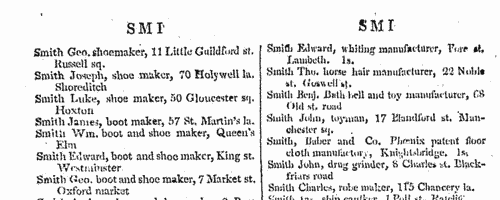
| Chester Freemen Voters
(1818)
Mr John Dodd (D) and Mr George Wildig (W) stood as candidates in 1818 for election by the freemen of the city of Chester as Sheriff of the People. The poll book lists all voters with full name (surname first), address, occupation, and a D or W according to their vote. | Sample scan, click to enlarge
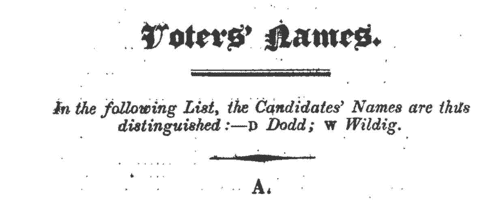
| Newcastle-under-Lyme Directory
(1818)
The Staffordshire General and Commercial Directory was published by W. Parson and T. Bradshaw in 1818 in sections, the first seven relating to the north of the county: 1. Newcastle-under-Lyme; 2. Golden Hill, Tunstall &c. (including Talk'o'th'Hill, Red Street, Chesterton, Greenfield, Sandiford, New Field and Brown Hills); 3. Burslem &c. (including Longport, Cobridge and Hot Lane); 4. Hanley and Shelton; 5. Stoke, Etruria and Penkhull; 6. Lane End &c. (including Fenton and Lane Delph); 7. Leek. In each section the traders are listed alphabetically under surname, with occupation and address. | Sample scan, click to enlarge
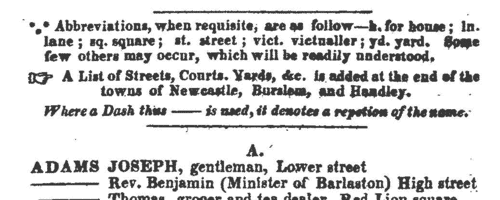
| Workers at Pooley's Cotton Mill, Manchester
(1818)
The minutes of evidence taken before the Lords Committee on the Cotton Factories Bill include a series of reports by medical men as to the general health of the mill workers in April 1818. For each factory there is a complete list of workers, giving full name, age, how long employed in a factory, health (in general terms, such as 'Good' or 'Sickly'), and any chronic disease or 'distortion', cause and duration - with slight variations from report to report. The physicians examined several hundred people each day, asking such questions as 'Have you any swellings or sores anywhere?', 'Are your limbs straight?', 'Have you a good appetite for food?', 'Do you conceive yourself to be in good health?', and all concluded that the health of the mill workers was good, and that the workers were cheerful. This is the report for Messrs John Pooley junior & Co.'s cotton spinning factory in Hulme, 21 April 1818. | Sample scan, click to enlarge

| Bankrupts
(1827)
Bankruptcy notices for England and Wales: bankruptcy often caused people to restart their lives elsewhere, so these are an important source for lost links
| Sample scan, click to enlarge

|
Research your ancestry, family history, genealogy and one-name study by direct access to original records and archives indexed by surname.
|












